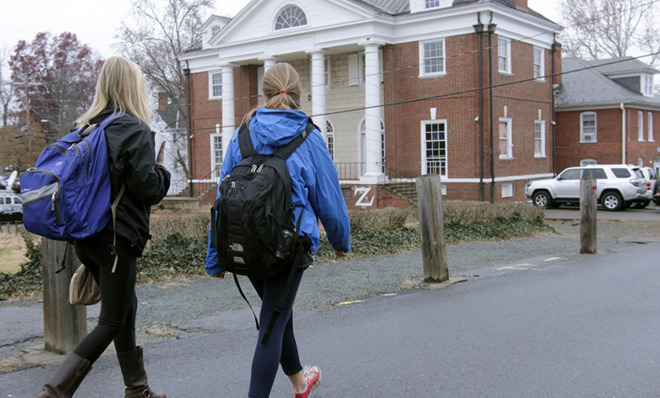What progressives don't want to talk about in the Rolling Stone scandal
A presumption of truth in every rape accusation is an impossible standard. And it's doing real damage to the cause of fighting sexual assaults.


A free daily email with the biggest news stories of the day – and the best features from TheWeek.com
You are now subscribed
Your newsletter sign-up was successful
In a news cycle seemingly incapable of producing anything but sadness, few recent stories have been quite as awful as Rolling Stone's investigation into an alleged gang rape at the University of Virginia.
Taken at face value, the story told is of a brutal and unconscionable crime, a coordinated and premeditated sexual assault on a defenseless woman used as a kind of initiation ceremony into a fraternity. Now the magazine has distanced itself from the story, the fraternity in question has rebutted some of its claims, and anti-rape activists at UVA have expressed skepticism in the accuser, known as Jackie. Day after day, new doubts emerge.
If the story turns out to be significantly fabricated (and the doubts expressed do not yet amount to proof that it was), then the costs could be considerable. With a committed group of rape denialists active in our culture, typically made up of "men's rights activists" and conservative anti-feminists, the danger of this type of scandal lies in the potential for a false accusation to crowd out attention to rape writ large. "Rape stories," The Atlantic's Olga Khazan recently wrote, "are a genre that's uniquely unforgiving of inaccuracies."
The Week
Escape your echo chamber. Get the facts behind the news, plus analysis from multiple perspectives.

Sign up for The Week's Free Newsletters
From our morning news briefing to a weekly Good News Newsletter, get the best of The Week delivered directly to your inbox.
From our morning news briefing to a weekly Good News Newsletter, get the best of The Week delivered directly to your inbox.
The question is, why? Why would revelations that a particular high-profile accusation was false be so potentially damaging to efforts to oppose that crime in general? This logic does not extend to other crimes; no one believes that a false claim of robbery means that robbery doesn't happen or only happens rarely. Why would sexual assault be any different? Why is our understanding of rape seen as so vulnerable to the corrosive power of false accusations?
The first and most important reason is the previously-mentioned denialism, that committed group of vocal opponents of anti-sexual assault measures.
But I fear that another reason for this danger stems from the very people in media who are most passionately committed to denouncing rape. By creating the expectation that all rape accusations must be presumed true regardless of circumstance, anti-rape activists have tied the credibility of their efforts to every individual accusation, and in so doing perversely undermined our efforts to end sexual assault.
From both supporters of the original reporting and doubters alike, a central question has emerged: Why did Sabrina Erdely, the story's author, fail to interview any of the accused? This question was initially pressed by The Washington Post's Erik Wemple and Slate's Hanna Rosin and Allison Benedikt. It would seem to be a glaring and obvious omission; as much as her story concerned campus rape in general, its central, most powerful passage concerned the fraternity gang rape. A story of that prominence and emotional power was inevitably going to take on the lion's share of attention. So how could Erdely have failed to do proper diligence, especially with a story so certain to generate attention and controversy? More generally, why did Erdely not do more to vet Jackie's story, which could have potentially saved Erdely, Rolling Stone, and Jackie a great deal of embarrassment and trouble?
A free daily email with the biggest news stories of the day – and the best features from TheWeek.com
In fact, in the context of today's elite media culture, the failure makes sense. In progressive online circles, particularly Twitter, a powerful social norm has emerged: Decent people have a moral obligation to believe all rape accusations, and failure to do so amounts to anti-feminism or worse. Recently, the writer and lawyer Zerlina Maxwell advocated for exactly that at The Washington Post. Others, such as Jessica Valenti, have suggested the same. Spend any time in the progressive corners of the internet and you'll see the power of this norm.
Indeed, both Wemple's and Rosin and Benedikt's initial pieces questioning Erdely's reporting earned complaints of rape denial on Twitter. The social risks of being seen to express skepticism towards any given accusation of rape are now so powerful that many people avoid even the suggestion of doubt. Those who are willing to question individual accusations, like Cathy Young, are subject to repeated and vociferous criticism. In such an environment, it's no wonder Erdely felt little urge to interview the alleged assailants. To do so in our media culture was to invite risk and little reward.
But as the ensuing days have proved, there is considerable danger in applying this standard to journalism, and not merely for the accused. Ultimately, refusing to subject accusations of rape to rigorous review hurts accusers, by failing to build the strongest case on their behalf, and other victims, by producing ambient skepticism in the culture.
Take, for example, the accusation against musician Conor Oberst that emerged last year, which was later entirely recanted by his accuser. These accusations emerged piecemeal, first from comments on the website xoJane and later in an essay published on that site, from an initially pseudonymous accuser. This would seem to be a situation where care and skepticism are warranted; internet comments are, famously, the Wild West, largely unregulated spaces where people can say anything and usually do. It's easy to imagine someone making an accusation in such a space and having the story spiral out of control — which is exactly what happened in this instance.
But prior to Oberst's exoneration, skepticism about that accusation was met with anger. Jezebel's Tracie Egan Morrissey, for example, asked, "Why would she want to hurt Oberst? And why would someone lie about being sexually assaulted? What could be gained from that? Nothing, really." This attitude presumes a rational mindset; Oberst's accuser later explained that she was driven to lie in part by grief over a sick child. Regardless, those who had reacted angrily to doubts about Oberst's guilt were left to retract their previous support, and in so doing, gave space to those who would deny rape writ large. Going to bat for every accusation, no matter how credible the evidence or circumstance, only plays into the hands of denialism when accusations are revealed to be false.
The insistence that every rape accusation must be presumed to be true inevitably means that the credibility of those opposing rape will always be bound up with the least credible accusation. This, perversely, makes it harder for those people to speak out against rape, not easier. The notion that rape victims should be believed by default seems humane and understandable. But in practice it leads to a condition where all rape accusations must be true for any individual standard to be taken seriously. That's an impossible standard, one no crime should ever have to meet.
You can see these risks in those who have responded to the skepticism about the story by doubling down on their insistence that it is true. Gawker's Sam Biddle, for example, published a piece arguing that the rebuttal by the fraternity does little to dispute the accuser's story. Meanwhile, the hashtag #IBelieveJackie has gained traction on Twitter, with many arguing that even after the recent revelations, failure to believe the accusations reflexively amounts to anti-feminism or rape denialism in and of itself.
But consider the potential consequences of this kind of engagement: What happens if more information emerges that casts doubt on the story? What if there is a high-profile recantation, the way there was with the Oberst accusation? Those who are now doubling down will simply have their credibility further undermined. The denialists will enjoy another talking point.
The refusal to adjust opinions in light of new information will play right into the denialist narrative, in which the media is determined to see rape everywhere regardless of facts. If the UVA gang rape allegations are found to be false, many people will have risked their credibility on this issue, and for little gain.
Rather than doubling down, the most sensible strategy for those committed to ending campus rape is to broaden out: While Erdely's story may be untrue, and her journalistic failures egregious, the important point was never that individual story but the larger need to fight rape on campus. We have a lot of work to do in that regard, and a clear moral responsibility to do so.
It isn't necessary for us to presume every individual accusation is true in order to work against sexual assault. The ways in which terms like "rush to judgment" and "due process" have gotten lumped into rape denialism does the movement against rape no favors. After all, while we can feel confident that false accusations of rape are rare, we also know that the system frequently fails to produce just outcomes in rape trials, with unjust outcomes falling along typical lines of class and race. In the long run, we will produce the most just outcomes by pursuing the truth about rape allegations the same way we should pursue all criminal allegations: by taking those allegations seriously, by investigating them rigorously, and by using consistent and fair standards of evidence. A commitment to a fair and careful process will ensure far better outcomes than social norms about believing all accusations ever could.
The allegations detailed in Rolling Stone, and the continuing, nightmarish saga that has followed, represent something like a worst case scenario for this norm: the insistence that skepticism or review of any rape allegation necessarily amounts to rape denialism leads a reporter to fail to do basic diligence in her reporting. That in turn leaves her vulnerable to the terrible fallout of this case, which could do deep, lasting harm to our efforts to fight campus rape. Sabrina Rudin Erdely clearly failed in her reporting; she failed Rolling Stone, she failed her readers, and she failed Jackie. Frankly, I think she should never be hired by a major publication to do investigative reporting again. But on a deeper level, this type of problem is the product of the norm itself, as it leaves us constantly at risk of investing our credibility in allegations that are not credible. It was inevitable.
"Feminism is not fragile," wrote Judith Levine regarding this situation. Our commitment to fighting rape must be equally strong. It can, and must, survive in a world where we know that not every allegation is true.
Freddie deBoer is a doctoral candidate in rhetoric and composition at Purdue University, where he studies literacy assessment and applied linguistics. He blogs at fredrikdeboer.com/blog.
-
 'Once the best in the Middle East,' Beirut hospital pleads for fuel as it faces shutdown
'Once the best in the Middle East,' Beirut hospital pleads for fuel as it faces shutdownSpeed Read
-
 Israeli airstrikes kill senior Hamas figures
Israeli airstrikes kill senior Hamas figuresSpeed Read
-
 An anti-vax conspiracy theory is apparently making anti-maskers consider masking up, social distancing
An anti-vax conspiracy theory is apparently making anti-maskers consider masking up, social distancingSpeed Read
-
 Fighting between Israel and Hamas intensifies, with dozens dead
Fighting between Israel and Hamas intensifies, with dozens deadSpeed Read
-
 United States shares 'serious concerns' with Israel over planned evictions
United States shares 'serious concerns' with Israel over planned evictionsSpeed Read
-
 Police raid in Rio de Janeiro favela leaves at least 25 dead
Police raid in Rio de Janeiro favela leaves at least 25 deadSpeed Read
-
 Derek Chauvin's attorney files motion for new trial
Derek Chauvin's attorney files motion for new trialSpeed Read
-
 At least 20 dead after Mexico City commuter train splits in overpass collapse
At least 20 dead after Mexico City commuter train splits in overpass collapseSpeed Read



